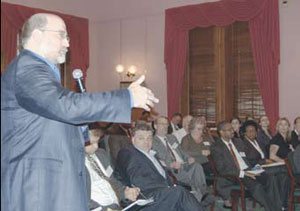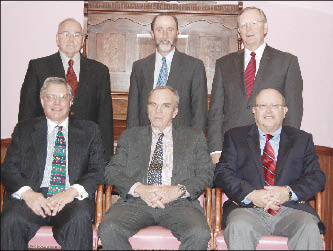They talked about earmarks. (They’re all against them.) They talked about interagency politics. (It caused some more trouble than others.) They talked about advocacy. (They urged their successors to embrace it.)
When six of the seven living former administrators of the U.S. Office of Juvenile Justice and Delinquency Prevention (OJJDP) gathered for the first time on Nov. 10, they spoke frankly and at times humorously about everything from how they got the job and how they awarded grants to how they worked with and sometimes against elements of the juvenile justice field, Congress and the Department of Justice.
The OJJDP@35 forum in Washington, hosted by Youth Today with funding from the Annie E. Casey Foundation and the John D. and Catherine T. MacArthur Foundation, drew an audience of 130 advocates, foundation leaders, OJJDP staffers, researchers and executives of national programs that serve juvenile offenders.
“It was a bridge between generations,” said Liz Ryan, CEO of the Campaign for Youth Justice.
Not in attendance were the two administrators at the bookends of OJJDP history. The first presidentially appointed administrator, Milton Luger, who oversaw the office for President Gerald Ford, died in 2001. J. Robert Flores, administrator for almost all of President George W. Bush’s tenure, declined to attend.
The administrators themselves had barely interacted with one another in the past; some had never met. They had a lot to say.
Q & A About Leadership
Excerpts from the discussion.
Advice for the next administrator
 |
|
Laurie Robinson
|
Laurie Robinson, the assistant attorney general who oversaw OJJDP during the Clinton administration and serves in the same position in the Obama administration: “If you had one piece of advice to give the new administrator coming in, what would that be?”
Rector, talking about appearing before the Senate to discuss what the administrator would like to accomplish: “Express an interest perhaps in three major subjects. There’d be one that you really want. And you wouldn’t act like you wanted it.” [Audience laughter.]
Schwartz: “One is a piece of advice I got from some others: Decide what are the one or two priorities, things that you really want to try to accomplish. … The second is, don’t shut yourself off from information. This is a big country and there are a lot of smart people.”
Bilchik: “We have an extraordinarily sophisticated juvenile justice community in this country. Before I set any agenda, I would listen to that community. Then take the knowledge we have about what works to address those things and be the leadership office you need to be.”
Competing voices
Tara Andrews, deputy executive director of the Coalition for Juvenile Justice: “You hear from all sides: You hear from Congress, state-based advocates. You hear from the White House, state officials, law enforcement and practitioners. How should OJJDP sort through all of those different voices and opinions and find its own voice and be the leader on issues that are of importance to the field?”
Schwartz: “Tough question. … The office needs to assemble information, sift through it, and try to serve as a bully pulpit. … The administrator and the office need to play a leadership role. It’s not just reacting but also being proactive.
“On the issue of removing children from adult jails,” an amendment added to the 1980 reauthorization of the Juvenile Justice and Delinquency Prevention Act (JJDPA): “We had the National Sheriffs’ Association, the American Correctional Association supporting it. One of the groups that was slow was the National Coalition of State Juvenile Justice Advisory Committees. They were afraid of what might happen in their own states. There was some controversy about getting children out of adult jails.
“I had to assume some leadership at a national meeting to stand up and point that out. … I think they were a bit embarrassed into supporting it. The point that I want to make here is that the administrator has to be a leader.”
Regnery: “I had an enormous number of people coming to me from every direction. Probably more than anything else, they wanted the money. They were more concerned about who was getting the grant than they were about the direction of the office.
“On the other hand, you have the staff. … They were well-informed on the issues, they knew what had been tried before, what worked. You have to compare their interests and the positions that the staff take to the people on the outside, and mix the politics into all of that to try to keep the priorities straight.”
Where to Put OJJDP?
When OJJDP was created in 1974, there was debate about whether it should be housed within the Department of Health, Education and Welfare (HEW), which later became the Department of Health and Human Services (HHS) or the Justice Department’s Law Enforcement Assistance Administration (LEAA), which was eventually replaced by the Office of Justice Programs.
Jeffrey Butts, executive vice president for research, Public/Private Ventures: “Was this the right home for the juvenile justice program? Would it have been more protected had it been in HEW, then HHS? There always [is] the tension between law enforcement and social services.”
Rector: “That’s sort of where my boss, [Sen.] Birch Bayh, and his allies started out in ’71,” to put OJJDP within HEW. “But in all candor, we did oversight hearings of HEW efforts. … We didn’t really find as much empathy [for troubled youth] there as the stereotype might suggest.”
Bilchik: “This question is one … I asked myself a number of times. Is it better at HHS or at Justice? Every time we deliberated, we always ended up [saying] that the best place was at Justice.”
“The anchor to OJJDP is its connection to the justice system. … It’s tied to the courts; it’s tied to law enforcement – all those partners that are inherent in the justice system.”
Schwartz: “You know, the child welfare system is not quite as benevolent as a lot of people might think. … When I was in the office, if HHS would have had it, I think it would have been a disaster. I don’t think they would have paid any attention to it.”
JJDPA reauthorization
The JJDPA is up for reauthorization.
Mark Soler, executive director, Center for Children’s Law and Policy: “What’s the role of OJJDP, particularly the administrator, during the reauthorization process?”
Schwartz: “One of the key roles is to play an educational role with respect to the administration” regarding juvenile justice issues. … “You are in a political context, and you need to recognize that.”
Bilchik: “The element that sometimes is missing is the opportunity for the administrator in talking with the field, because the field is very active in the reauthorization process. So you’ve got this triad of the congressional staffers, the administration and the field.
“How well the administrator takes that cacophony of noise and helps to create some orchestration to it, and make sense, [so] we’re working toward something in a similar vein, is probably the main task.
“There are certain limitations you have to being a team player, once it’s done. There’s opportunity for putting on a trench coat in the dark of night and going into a back alley and sharing an idea with somebody” from the field about an aspect of the reauthorization. “Not that I ever did that.”
Need for research
The issue of conducting and disseminating research was raised repeatedly by the former administrators and also by some attendees.
Speirs: “I really believe the future of juvenile justice … has to come through the evidence-based programming. … I don’t think it’s been until about the last seven to eight years that you walk in with your information and you say ‘This is what we’ve achieved.’ And to be able to show the result of what we’re doing.”
“The field [of criminal justice] has a lack of knowledge about JJ, particularly young people coming up and maturing into middle managers. I think it [disseminating research information] has to come back as a priority.”
Sweet: “The thing I would like to see is more real research and clinical trials and evidence-based information.” When he saw the programs described on the OJJDP website, he felt that “it’s pretty much the same kind of things” as when he was there.
Need for advocacy
Speirs, discussing “negative pressure” on juvenile justice funding around the country: “Funding is moving away. … You need to strengthen the office, because the states do manage juvenile justice, but there needs to be a strong federal voice about what should be going on and where we should be moving forward.”
Q & A About Money
Excerpts from the discussion.
|

Jeffrey Butts of Public/Private Ventures
|
Grants and politics
Mark Soler, executive director, Center for Children’s Law and Policy: “The previous administrator [J. Robert Flores] had been severely criticized for favoritism, and I guess irrationality, in awarding discretionary grants. Could you tell us what the next administrator should do to restore integrity to the office?”
Bilchik: “I think the office had an evolution of its grant-making process that built greater and greater rigor and integrity around the selection of grantees – through an external peer review policy, through a very transparent accountability around the criteria for the grant selections.
“That has been undermined. … To me, the solution here is really easy: that is, a very transparent movement back to those criteria and the methodology that was used” in selecting grantees.
“This transcends politics, because it goes to the very integrity of the grant-making process of an office that is largely about grant making and the leadership associated with that.” [Audience applause.]
Rector: “Even if you had some different criteria, you can still get hammered politically. … It’s all political.”
“There was a grant that caused more controversy. … It was the Boy Scouts of America, some sort of naval aspect of the Boy Scouts. They wanted me to give a couple of hundred thousand dollars to dedicate it in the name of J. Edgar Hoover, this special thing. I just wouldn’t do it. … We just didn’t think he was a good model for kids. [Audience laughter.]
“In terms of incoming – look at the board of the Boy Scouts of America. I had [former Secretary of Defense] Melvin Laird calling me at home. Generals from the war in Vietnam. Somebody offered to make me an honorary scout of the year if I’d just sign it.”
Regnery: “You pay the price for the grants you don’t make, as well as those that you do make. For every 10 people who want money, one’s going to get it, so the other nine are going to be on your case.”
Schwartz: “You need to have transparency, and there needs to be a good review process that’s open … and you let the chips fall where they may.”
Who watches the administrator?
Several people raised what they saw as a structural conflict: There is an assistant attorney general (AAG) overseeing the heads of five Justice Department agencies, including OJJDP, and all six of them are appointed by the president and confirmed by the Senate. This sometimes causes clashes in which the AAG tells the OJJDP administrator who can and cannot get grants.
Sweet: “I think it’s impossible to really accomplish the objectives . . . with the current structure, because you have an assistant attorney general with no program authority, and you’ve got five prima donnas that have been confirmed by the Senate, and are there by presidential appointment. They also have ideas, and they want to do what they think the president is asking them to do. How to pull all of that together was a challenge that I couldn’t have accomplished, although I tried. That’s why they fired me.” [Audience laughter.]
Jeff Slowikowski, acting administrator, OJJDP: “When you as a presidential appointee are coming in to be an advocate of the juvenile justice community and as a representative of the administration. How do you balance that when you may not have the support of a Janet Reno or an Eric Holder [as attorney general]? If you don’t have the leadership at the higher level, then you don’t have the authority to make the grants that you may believe need to be made to move the field forward.”
Bob Sweet: “I was put in the position a number of times where it was pretty dicey to figure out whether or not you could approve a particular grant to support a bigger policy agenda without running close to the edge of whether it was really within your mandate. I refused to do that on one specific occasion.”
“I would hope there would be some contact with the staff that does this up on the Hill and have some discussion about how to help elevate the juvenile justice area to the point where they do have authority that’s defined. Right now, it’s undefined.”
Bilchik: “On one level, Jeff, I want to say I feel your pain. It must have been the most painful process to experience for the past eight years, to watch the denigration of the office and not be able to do anything about it.” (Slowikowski worked at OJJDP under Bilchik as well as Flores.)
“What happened over those eight years was failed leadership. … There has to be somebody in the chain [of command], that they’re doing their job, that does pay attention. And if they don’t, then Congress has to pay attention. And none of that happened effectively during the Bush administration.”
Earmarks
Asked by the moderator if they support elimination of earmarks, all six former administrators raised their hands to indicate that they do.
Schwartz: “The administrator who’s going to come in, in a way, is sort of cash-strapped. … I think that’s a major, major problem that needs to be addressed.”
Bilchik: “That’s an easy question to answer if it’s just thumbs up thumbs down. I also live in a real world. … It’s rampant through the entire federal government. [The challenge is] making the commitment through the administration, through OMB [the Office of Management and Budget] and through Congress to fund the office at a level that allows it to do its work. If there are going to be earmarks … to make sure they don’t interfere with the office doing that work.”

































